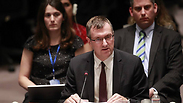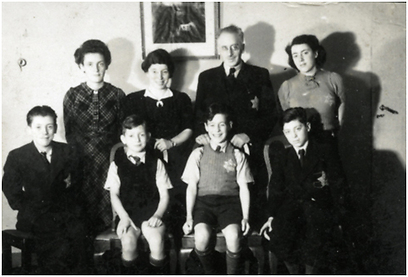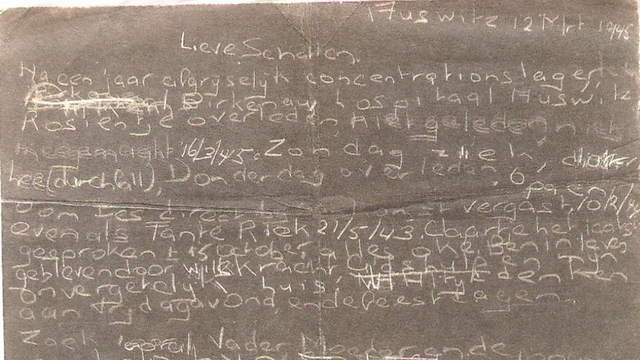
At the UN, remembering my aunt Adela
Op-ed: Sitting at General Assembly as a representative of Israel, I thought of words of aunt I never knew, who died at age of 20 after Auschwitz liberation: 'I survived because of willpower, the help of God, and our unforgettable home.'
Two days later: "I survived because of willpower, the help of God, the unforgettable home memories of Friday nights and the holidays. Looking everywhere for (my) father, mother and brothers. Looking for help to return home soon, to see each other very soon, as soon as possible. Adela."
This postcard, written by my aunt Adela a month and a half after the liberation of Auschwitz, accompanied my grandmother Yohana throughout her life. It constantly reminded her of her beloved daughter who managed to survive the horrors of the Holocaust, but whose frail body could not recover to keep on living. Adela was 20 years old when she died.
Today, with two of my children being older than Adela at time of her death, I look at her words with admiration and wonder. So much willpower, so much love and dignity found in such a young woman. In very few words she manages to release her parents from the anguish of not knowing their family’s fate, gave the dates when their loved ones perished so that the Jewish annual Remembrance Day (yahrtzeit) can be held, as well as attribute her survival to the values her parents instilled in her.
On her deathbed, Adela allowed her parents and brothers to cling to life and to move on, as if she were telling them, in the words of Israeli poet Lea Goldberg, "And once more you will love."
The lessons of the Holocaust were a guiding light for the founders of the United Nations, but only in 2005, six decades later, was theInternational Holocaust Remembrance Day finally established.
The query why it took so long is not philosophical. Nor is it relevant only to historians or experts of Jewish studies. It relates to the international willingness to deal with the threat of genocide and crimes against humanity.
Last year was marked by the 20th anniversary of the horrendous genocide in Rwanda and many repented the world’s sin of keeping silent and failing to act. In the background of such atrocities, genocides and mass murders continue. In Syria more than 200,000 people have been intentionally killed by starvation, chemicals, torture and intentional bombing of civilians. But the world, yet again, seems paralyzed and reluctant to intervene to save the innocent.
Even against these odds Israel must not give up. We will continue to articulate our desire for peace and our historical and moral right to live as a free nation alongside our neighbors. No criticism will stray us from our commitment to the Jewish ideal of "Tikkun Olam" (to heal the world), by working to contribute toward a better future. Israel is proud to be a leading contributor to the war on Ebola and a leader in promoting initiatives to encourage human rights, including the rights of women and LGBT, as well as in efforts to protect the environment and in working for a better world for future generations.
As representatives of Israel, we are also committed to Diaspora Jewry. Lately we are witnessing anti-Semitism rearing its ugly head again. Global anti-Semitic terrorism can be seen from Mumbai to Brussels, and from Burgas to Paris.
Back again is the rise in anti-Semitic incitement, statements, threats and violence directed against Jews only because they are Jews. The sight of Jews forced to remove skullcap from their heads and mezuzahs from their doors takes us back to dark times. The only way to eliminate this social disease is to eradicate it altogether. As long as anti-Semitism in one country prospers, other countries are not immune.
Last month, for the first time ever, the UN General assembly held a special meeting with the goal of confronting the rise of anti-Semitism and suggesting ways to eradicate it. Israel, together with dozens of other countries, declared that the world would fight this phenomenon and would not stand silent.
Seventy years after the liberation of Auschwitz, the president of the State of Israel spoke at the UN on the occasion of International Holocaust Remembrance Day. President Reuven Rivlin symbolically chose to address the full room in Hebrew.
Sitting at the General Assembly as a representative of Israel, I thought of the words of the aunt I never knew: "I survived because of willpower, the help of God, and our unforgettable home."
Ambassador David Roet is Israel's deputy permanent representative to the United Nations in New York and an Israeli diplomat for the last 27 years. His father, Haim Roet, brother of Adela, is a Holocaust survivor from the Netherlands. Haim Roet is the initiator of the "Unto Every Person There is a Name" Holocaust memorial project, chairman of the Committee for the Recognition of Jews who Rescued Jews During the Holocaust and the initiator and founder of Tze'ela – Citizen's Team Action for Social Improvement.












